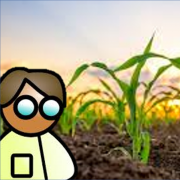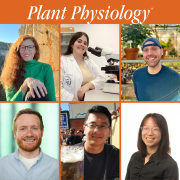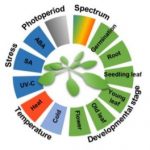Informational Interview with a data scientist at Bayer: Dr. Sofía Brandariz
I had the honor to interview Dr. Sofía Brandariz from Bayer Crop Science. She is originally from Uruguay, where she did her undergrad and masters and then moved to the US to complete her PhD degree under Dr Bernardo at UMN. Then, she transitioned from PhD directly to her current job at Bayer. There she is a data scientist, specifically a corn quantitative geneticist.
Today I am here With Dr. Sofía Brandariz
She is a data scientist focused on quantitative genetics at Bayer and she is going to tell us a little bit about herself and her career.
Thank you Dr. Brandariz for your time and for talking to me today.
1. I would like to start with by asking about yourself, what is your and background, I know you are from Uruguay, why did you study plant sciences, what was your motivation or interests?
-Agronomy Engineer (5 years career) in Uruguay
-Master of Science in Agriculture. Major in Biostatistics
-Ph.D. in Applied Plant Sciences, Plant Breeding/ Molecular Genetics
I wanted to be a physician but then I realized I liked genetics mostly, and I loved plants, so I did Agronomy and during my undergrad I started focusing in quantitative genetics. Agronomy is very important in Uruguay, so I knew the relevance to society contribution from food production perspective. As a scientist, we should be proactive in communicating to society how food is produced and processed, what genetic alterations are done and how we should trust what science tells us.
2. I saw in curriculum that you interned at Driscoll as a quantitative geneticist—did you find that internship helpful for finding jobs later?
I knew from the beginning I liked plant breeding, so I contacted a great professor in Uruguay (now she works as a professor at UM-Wisconsin) and started doing my undergraduate thesis with her. Along with coadvisors, I did my Master thesis as well in Uruguay, I worked with barley and wheat, both crops are very important there (as well as around the globe). I was a TA in the stats department of the Agricultural College while in Uruguay, so I improved then my communication skills. She connected me with Dr Bernardo at UMN (he’s an amazing advisor, https://agronomy.cfans.umn.edu/department-directory/rex-bernardo), where I did my PhD thesis in maize working with the company data (Bayer legacy Monsanto). Doing my PhD, I did an internship at Driscoll’s (https://www.driscolls.com/) working with the Molecular Biology and Strawberry teams, I learned a lot from industry, and I realized I would like to try it (been in academia so far before that). While doing my internship, a recruiter helped me improved my LinkedIn page and gave me valuable tips. I learned the importance of knowing how to analyze your data in any scientific area and how to collaborate with teams, I truly encourage internships if available!
3. How was the process to be hired at Bayer, what preparation was required to obtain the job you currently have?
My experience was a little particular as I was working with the company data already. A lab partner and myself that were using the company data were invited to a Hackathon, then my CV was required, and after a call interview, and I got a job offer. My hard work and being in the right place at the right time got me the position. In any case, you should be prepared for soft skills questions, those are the ones the company cares a lot (besides your technical skills) and I believe academia should start preparing better for those. Usually, HR will screen your application, if passed the hiring manager and others in the committee will check your CV and you will receive a call, and then you will have in person interviews.
4 What are your main responsibilities in your current role?
Discovery team to improve genetic gains and speed up the pipeline process: need to run simulations and if those go well POC (proof-of-concept) experiments and project manager; comes with new ideas to improve models; collaborate with Universities; help production pipeline to skip stages with analyses.
5. What does a typical day (or week) look like for you?
It depends, some days I am programming all the time and others I need to coordinate with field and lab employees the process for testcrossing or genotyping and so on. I do have a computer (desk) job.
6. What do you enjoy most about the work you do?
What I enjoy most is the challenge of coming with new ideas to make plant breeding more efficient, and to test those ideas, I think science is what keeps me motivated.
7. What do you enjoy the least? Or, is there something that surprised you about the role when you first started?
What surprised me is that I do not get to test (analyze, simulate) everything I want before starting an experiment, the pace is really fast and you need to keep up with it.
8. What do you wish you had known or done differently when you were starting out in this career/role?
Ask for help, and not to be shy. Collaboration is so very crucial, and I think I did not take that advantage of working with others and asking for help right away
9. What are some of the biggest challenges you face day-to-day?
A big challenge is getting to understand how everything works inside the company and to know who to ask that will be willing to help and that will know how to help you if needed
10. What about the biggest rewards?
Working with very smart people in diverse areas (molecular genetics, breeding, machine learning, among others)
11. What are some big projects you’re working on now or that you’ve finished up in the last few months?
Collaborating with UMN – Dr Bernardo and postdoc Dr Oyetunde – recombinations projects, his lab has good papers on it
Collaboration with maize pipeline to skip stages in the breeding production
Other recombination and modelling projects
12. Have you ever thought about switching to academia?
Where do you see yourself in 5 or 10 years?
I have only been in this position for less than 2 years, therefore I have not thought of switching to academia, though I am not sure where I see myself in 5-10 years, for now I am liking industry and I want to take advantage and learn as much as I can while I am here.
13. What advice would you give someone who is considering this type of job?
Be ready to: work in teams, be product focused, fast pace, adapt to changing situations, learn constantly
14. What skills/experiences or personality traits do you think are most important for someone interested in a job like yours?
I do not think there is an ideal set of skills, in fact, having a team with people with diverse backgrounds is ideal for any team, just be ready to do your best and enjoy the process!
15 Do you have any recommendations for other people I should talk to or other resources I should explore?
I would contact people from smaller companies and from academia to have different perspectives and to get a better idea of what would be what works best for you. Keep attending conferences and always keep your contacts updated of what your plans are! Also, look for a sponsor/mentor, that can guide you through the process
16. Would it be alright for us to stay in touch?
Sure!!
I think this is all I have for today
Again, thank you Dr. Brandariz for talking to me today, This was wonderful,
Thank you and have a great day.





